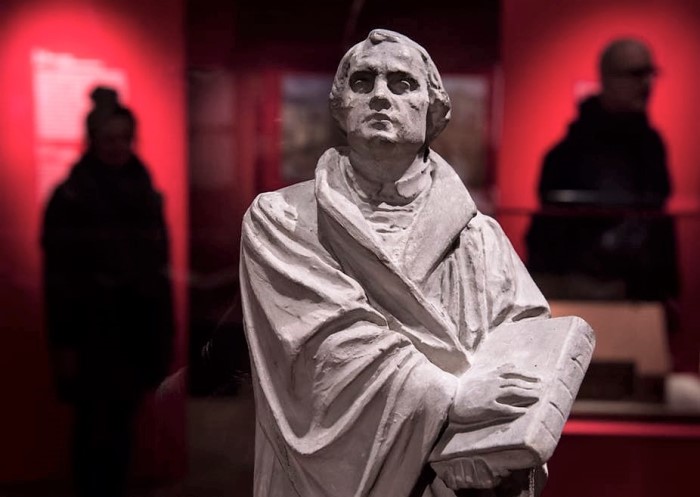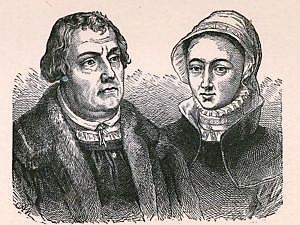
The statue of Martin Luther in the museum at Worms, Germany.
The last day in October has a special meaning for Protestant Christians throughout the world.
It was on October 3, 1517, when Martin Luther nailed his 95 Theses on the church doors of the Wittenberg Castle Church.
This action and the 95 Theses helped spark the founding of the Reformation and the division of Christianity into Protestantism and Catholicism.
The Catholic Church branded Luther and his followers ‘Protesters’ and this word, translated to Protestant during The Reformation, set the dividing line between the two camps and still does today.
Indulgences
Luther’s main aim was to overturn what he considered a form of corruption in the church, indulgences.
By Luther’s time, indulgences had evolved into payments that were said to reduce punishment for sins.
A person could pay the church a certain amount of money which would reduce their sins in the eyes of God and allow them into heaven.
Further, enough money would ensure deceased relatives also could be returned from purgatory and released into heaven.
Luther believed such practices only interfered with genuine repentance and discouraged people from giving to the poor.

Martin Luther nailed his 95 Theses (questions) to the door of the Wittenberg Castle Church on October 31, 1517.
Read often and well
One of Luther’s most important theological contributions was the “priesthood of all believers,” which implied clerics possessed no more dignity than ordinary people.
Less known is the crucial role Luther played in making the case for ordinary people to read often and well.
Unlike the papacy and its defenders, who were producing their writings in Latin, Luther reached out to Germans in their mother tongue, substantially enhancing the accessibility of his written ideas.
He was branded an outlaw for refusing to recant his teachings.
In 1521, Pope Leo X excommunicated Luther from the Roman Church.
His patron, Frederick of Saxony, saved Luther from further reprisal and had him taken in secret to a castle where he remained for two years.
It was during this time Luther produced an immensely influential translation of the New Testament into German.
Gutenberg’s earlier introduction of the printing press in 1439 made possible the rapid dissemination of Luther’s works throughout much of Europe, and their impact was staggering.
Early years
Born in Germany in 1483, Luther followed the wishes of his father to study law.
Once, while caught in a terrible thunderstorm, he vowed if he were saved, he would become a monk.
Indeed, Luther later joined the austere Augustinian order and became both a priest and a doctor of theology.
He later developed objections to many church practices.
He protested the promotion of indulgences, the buying and selling of clerical privileges and the accumulation of substantial wealth by the church while peasants barely survived.

Luther married a runaway nun, Katharin von Bora, thus creating another scandal.
Impact of Luther’s writing
Luther’s collected works run to 55 volumes.
It is estimated between 1520 and 1526, some 1,700 editions of Luther’s works were printed. Of the six to seven million pamphlets printed during this time, more than a quarter were Luther’s works, many of which played a vital role in propelling the reformation forward.
Thanks to Luther’s translation of the Bible, it became possible for German-speaking people to stop relying on church authorities and instead read the Bible for themselves.
Luther argued that ordinary people were not only capable of interpreting the scriptures for themselves, but that in doing so they stood the best chance of hearing God’s word.
He wrote;
“Let the man who would hear God speak read Holy Scripture.”
Luther’s Bible helped form a common German dialect.

Luther became even more famous with the number of quotes he made, had printed and distributed through Germany and later, Europe.
Luther gave Germans a common language
Prior to Luther, people from different regions of present-day Germany often experienced great difficulty understanding one another. Luther’s Bible translation promoted a single German vernacular, helping to bring people together around a common tongue.
In posting his 95 Theses, Luther was encouraging a vigorous exchange of ideas.
Luther trusted ordinary people to discern the truth. All they needed was the opportunity to interpret what they read for themselves.
Until his dying days though, Luther considered himself a Roman Catholic and had little, if anything, to do with the move toward Protestantism.

John Skinner served as an infantry soldier in Vietnam then the Tasmanian Police before taking up the position of CEO of the Australian Rough Riders Association (professional rodeo based in Warwick Qld). Before retirement to his small farm, he was a photo-journalist for 25 years. He is married with 3 children and 6 grandchildren.
John Skinner's previous articles may be viewed at http://www.pressserviceinternational.org/john-skinner.html

John Skinner served as an infantry soldier in Vietnam then the Tasmanian Police before taking up the position of CEO of the Australian Rough Riders Association (professional rodeo based in Warwick Qld). Before retirement to his small farm, he was a photo-journalist for 25 years. He is married with 3 children and 7 grandchildren.